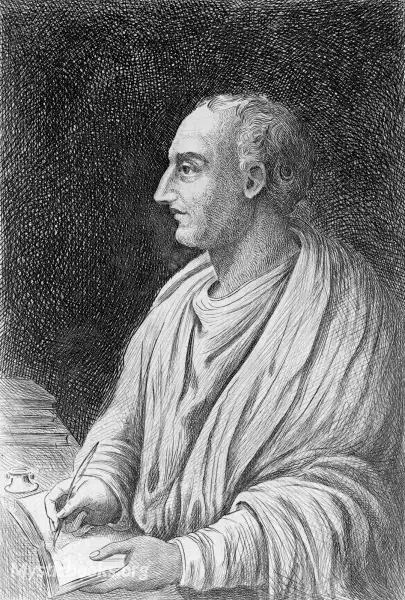
Timeline
Title
Country/Nationality
Titus Livius
Titus Livius, known as Livy in English, was a Roman historian. He wrote a monumental history of Rome and the Roman people, titled Ab Urbe Condita, ''From the Founding of the City'', covering the period from the earliest legends of Rome before the traditional founding in 753 BC through the reign of Augustus in Livy's own lifetime. He was on familiar terms with members of the Julio-Claudian dynasty and even in friendship with Augustus, whose young grandnephew, the future emperor Claudius, he exhorted to take up the writing of history.
Livy was born in Patavium in northern Italy, now modern Padua. There is a debate about the year of his birth – either in 64 BC, or more likely, in 59 BC. At the time of his birth, his home city of Patavium was the second wealthiest on the Italian peninsula, and the largest in the province of Cisalpine Gaul (northern Italy). Cisalpine Gaul was merged in Italy proper during his lifetime and its inhabitants were given Roman citizenship by Julius Caesar. In his works, Livy often expressed his deep affection and pride for Patavium, and the city was well known for its conservative values in morality and politics. "He was by nature a recluse, mild in temperament and averse to violence; the restorative peace of his time gave him the opportunity to turn all his imaginative passion to the legendary and historical past of the country he loved."
Livy's teenage years were during the 40s BC, when a period of numerous civil wars throughout the Roman world occurred. The governor of Cisalpine Gaul at the time, Asinius Pollio, tried to sway Patavium into supporting Marcus Antonius (Mark Antony), the leader of one of the warring factions. The wealthy citizens of Patavium refused to contribute money and arms to Asinius Pollio, and went into hiding. Pollio then attempted to bribe the slaves of those wealthy citizens to expose the whereabouts of their masters; his bribery did not work, and the citizens instead pledged their allegiance to the Senate. It is therefore likely that the Roman civil wars prevented Livy from pursuing a higher education in Rome or going on a tour of Greece, which was common for adolescent males of the nobility at the time. Many years later, Asinius Pollio derisively commented on Livy's "patavinity", saying that Livy's Latin showed certain "provincialisms" frowned on at Rome. Pollio's dig may have been the result of bad feelings he harboured toward the city of Patavium from his experiences there during the civil wars.
Livy probably went to Rome in the 30s BC, and it is likely that he spent a large amount of time in the city after this, although it may not have been his primary home. During his time in Rome, he was never a senator nor held a government position. His writings contain elementary mistakes on military matters, indicating that he probably never served in the Roman army. However, he was educated in philosophy and rhetoric. It seems that Livy had the financial resources and means to live an independent life, though the origin of that wealth is unknown. He devoted a large part of his life to his writings, which he was able to do because of his financial freedom.
Livy was known to give recitations to small audiences, but he was not heard of to engage in declamation, then a common pastime. He was familiar with the emperor Augustus and the imperial family. Augustus was considered by later Romans to have been the greatest Roman emperor, benefiting Livy's reputation long after his death. Suetonius described how Livy encouraged the future emperor Claudius, who was born in 10 BC, to write historiographical works during his childhood.
Livy's most famous work was his history of Rome. In it he narrates a complete history of the city of Rome, from its foundation to the death of Augustus. Because he was writing under the reign of Augustus, Livy's history emphasizes the great triumphs of Rome. He wrote his history with embellished accounts of Roman heroism in order to promote the new type of government implemented by Augustus when he became emperor. In Livy's preface to his history, he said that he did not care whether his personal fame remained in darkness, as long as his work helped to "preserve the memory of the deeds of the world’s preeminent nation." Because Livy was mostly writing about events that had occurred hundreds of years earlier, the historical value of his work was questionable, although many Romans came to believe his account to be true.
Livy was married and had at least one daughter and one son. He also produced other works, including an essay in the form of a letter to his son, and numerous dialogues, most likely modelled on similar works by Cicero.
Titus Livius died in his home city of Patavium in either AD 12 or 17; the latter would have been three years after the death of the emperor Augustus.
Books by Titus Livius

From the Foundation of the City Vol. 01
Ab urbe condita, is a monumental history of ancient Rome written in the Latin language by Titus Livius(Livy), an ancient Roman historian. The work covers the time from the stories of Aeneas, the earliest legendary period from before the city's foundi...

The History of Rome, volume 1
Embark on an epic journey through the cradle of civilization with "The History of Rome, Volume 1" by Titus Livius. Delve into the heart of ancient power struggles and the birth of a colossal empire. With riveting prose and meticulous detail, Livy unf...

The History of Rome, volume 2
In the tumultuous annals of ancient Rome, secrets are woven through the very fabric of power. As the dust settles from the epic battles and shifting alliances of volume one, the saga continues in "The History of Rome, Volume 2" by Titus Livius. Delve...

The History of Rome, volume 3
In the enthralling pages of "The History of Rome, Volume 3," Titus Livius unfurls an epic saga of power, conquest, and destiny. Step into the corridors of ancient Rome at its zenith, a world brimming with heroism and treachery, where emperors were ma...

The History of Rome, volume 4
In the heart of ancient Rome, a pivotal volume unfurls—a chronicle of power, ambition, and the relentless march of an empire. "The History of Rome, Volume 4" by Titus Livius invites you to witness the saga of a Republic teetering on the brink of tran...